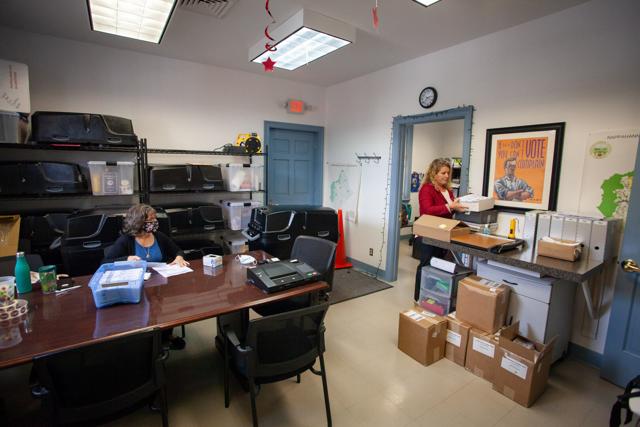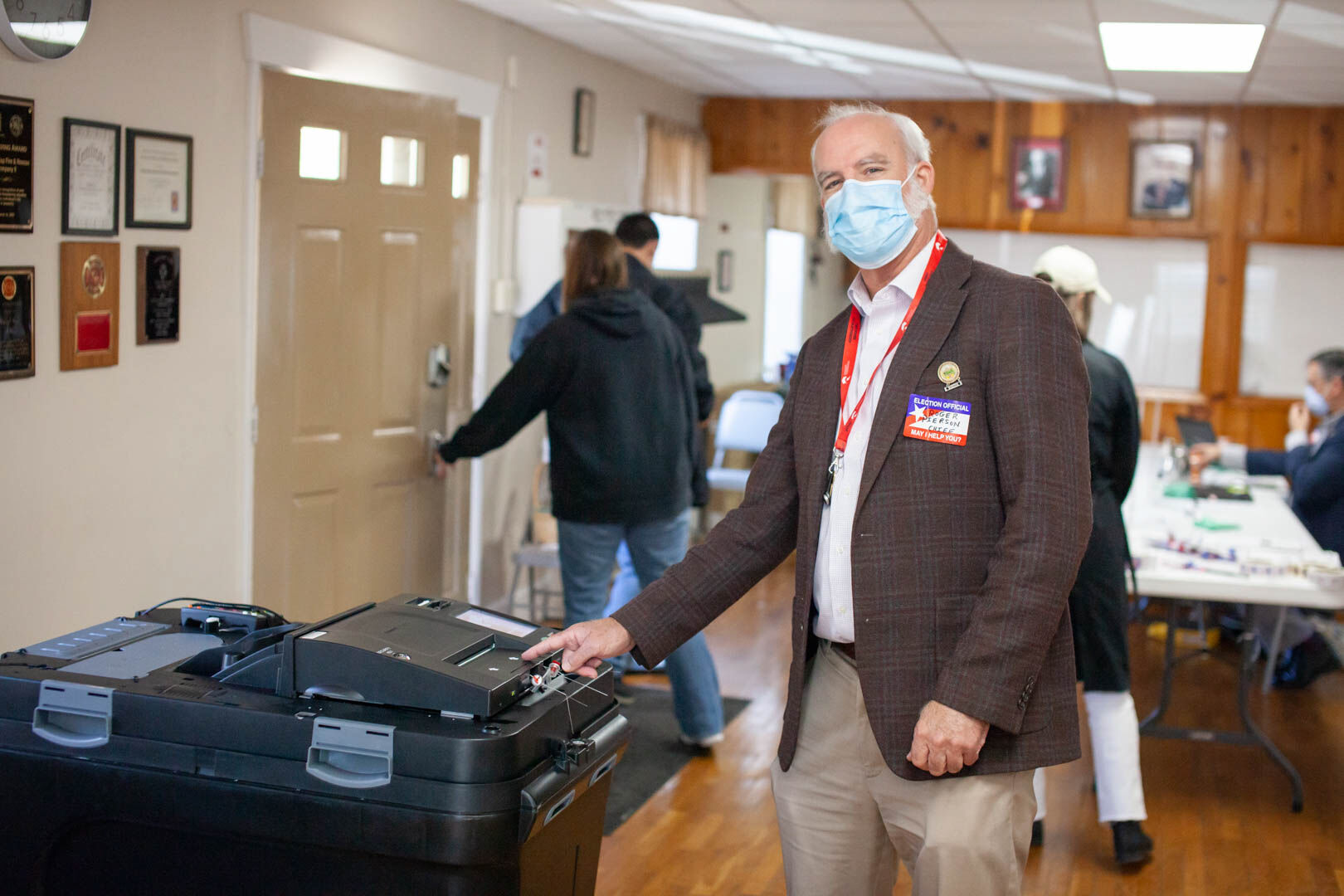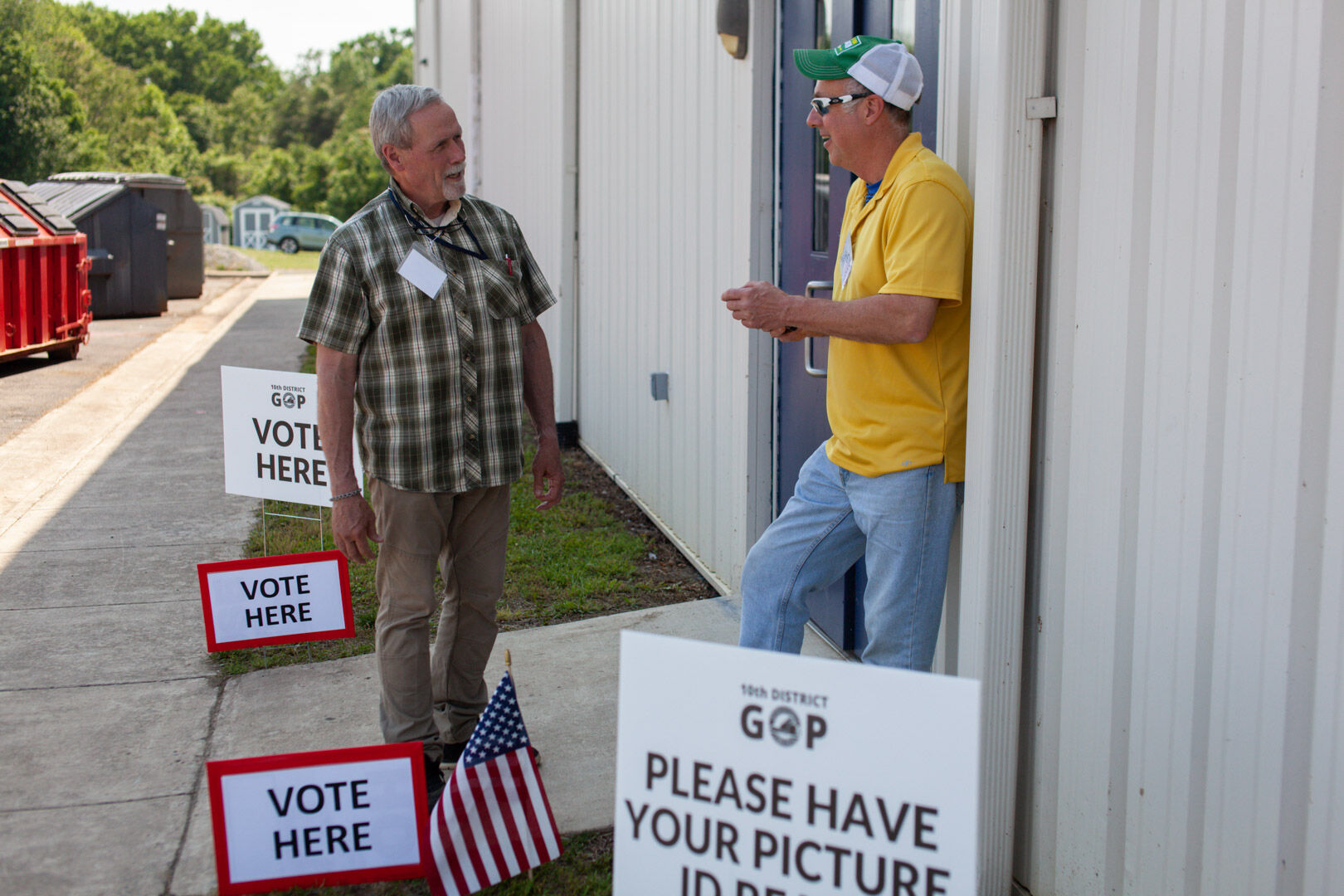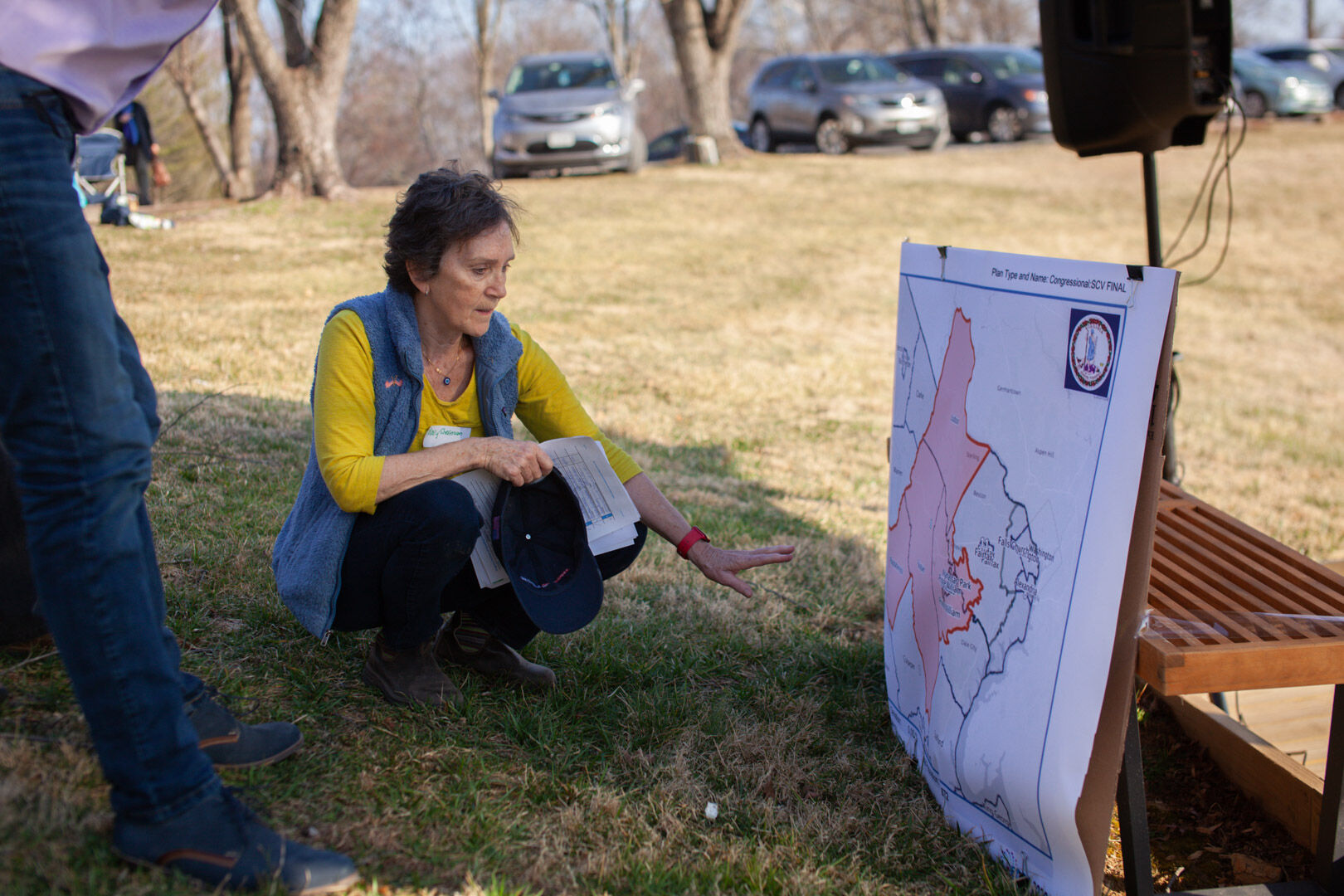Rappahannock party leaders have confidence in local voting officials
Media outlets and the internet are rife with stories about it. Some politicians and interest groups harp on about it. Election officials worry it undermines voter confidence.
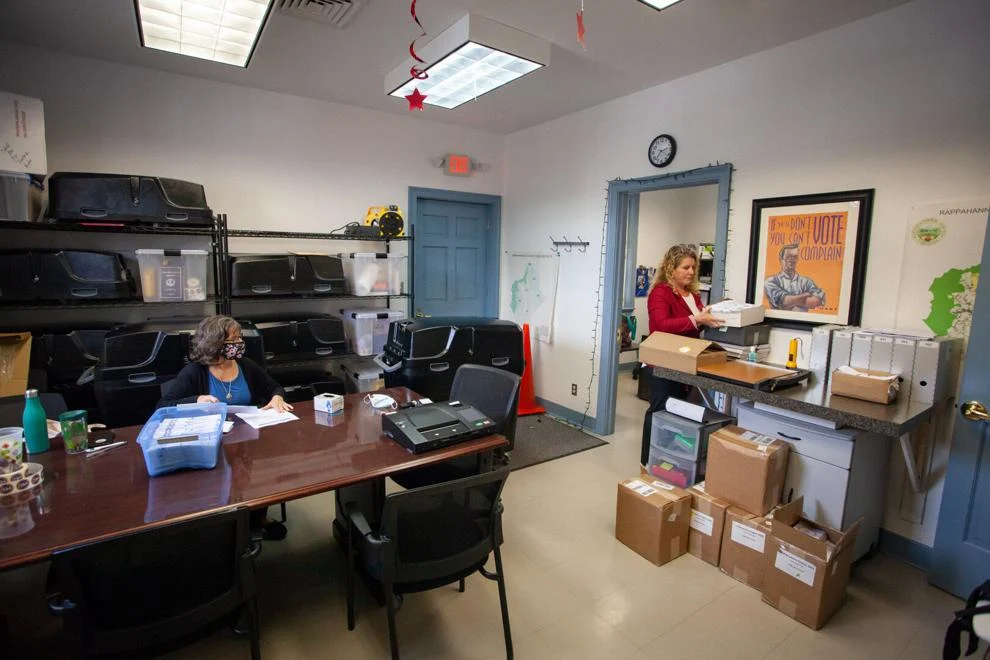
GATEKEEPER: Director of elections and general registrar Kimberly McKiernan (right) knows of no instance of voter fraud in Rappahannock. (Photo/Luke Christopher)
Is election fraud a serious threat to our institutions and the way we elect our officials, or is it a canard promoted by 2020 election deniers and conspiracy theorists? And importantly, as we approach elections early next month, can it happen here in Rappahannock County?
It hasn’t yet, according to Rappahannock County director of elections and general registrar Kimberly McKiernan, who said she knows of no instance of voter fraud here.
According to a recent poll conducted by Axios-Ipsos Two Americas Index, about four out of 10 Republicans and one in four Democrats believe election fraud will have played a role if their party loses control of Congress in the upcoming election.
Although most of the attention on election fraud has been focused on the closely contested “swing states” that played a decisive role in the 2020 presidential election, the Axios-Ipsos poll suggests that the issue is seeping into state and local elections.
Election fraud received heightened attention in Virginia last month when Attorney General Jason Miyares created a 20-plus person “Election Integrity Unit.” The unit is aimed at ensuring “legality and purity” in elections.
“I pledged during the 2021 campaign to work to increase transparency and strengthen confidence in our state elections. It should be easy to vote, and hard to cheat,” said Miyares in a prepared statement. “The Election Integrity Unit will work to help to restore confidence in our democratic process in the Commonwealth.”
Despite the unit’s charge, there have been few documented instances of voter fraud in Virginia. The Attorney General’s office, after reviewing the results of the 2020 election as well as many documents of concern identified by citizens and elected officials, did not find “any evidence of widespread fraud that would change the results of Virginia’s 2020 election,” according to spokesperson Victoria LaCivita.
LaCivita’s comments were bolstered by The Heritage Foundation, a national conservative think tank in Washington, D.C., that conducted a nationwide survey of election fraud cases. According to the organization’s database, Virginia had six convictions and one judicial finding of voter fraud over the past five years with one of those convictions occurring in 2020 and the other in 2021. In 2020, 4.5 million people voted in Virginia.
Checks and balances
McKiernan applauded the newly created statewide unit. “I think the AG’s newly formed unit will enforce the laws, as has always been the case,’ she said. “If it makes voters feel confident about our election system, I’m all for it.”
When asked if voter fraud could occur in Rappahannock, McKiernan pointed to a 573-page book outlining the Commonwealth’s dozens of voter laws and procedures. “We follow this to the letter,” she said. “We start with checking and cross-checking names and addresses for absentee ballots before they are mailed out. Before the election, our electronic voting machines are tested, sealed, and secured, with public observers in attendance. At the polls, voters are matched against the state voting database, and each and every ballot is accounted for.”
For those voters who do not have correct identification or are registered improperly, McKiernan explained they may cast a “provisional” ballot which would not be counted unless any discrepancies are resolved and after approval by the county’s three-member Electoral Board, comprised of Chair Denise Chandler, Vice Chair Ken Reid and Secretary Robert Klaus.
Election workers
Election workers receive hours of training on procedures including tracking and counting every ballot, checking voter IDs against data in polling books, troubleshooting problems with a voter’s registration, and maintaining order at the polling place. Each polling station is assigned a chief and assistant chief to oversee operations. Virginia law requires parity between the number of Republicans and Democrats who work at the polls “whenever practical.” If it is not possible for the parties to find individuals to fill the positions, unaffiliated election workers may be selected.
Roger Pierson, an aviation engineer who lives in Sperryville, has worked as a chief election officer at polling stations in Rappahannock for 22 years.
“I have full confidence in Virginia’s system for conducting elections,” he said. “There are detailed procedures in place to prevent fraud and to guarantee that every qualified person who desires to vote, can vote. I have not come across anyone who has knowingly tried to vote fraudulently.”
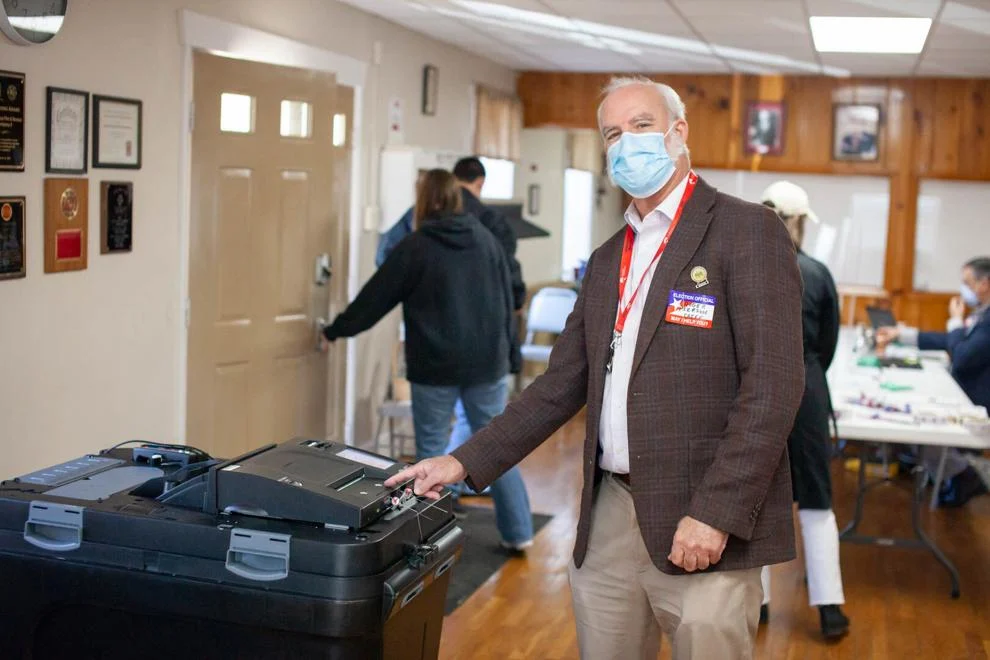
VETERAN OBSERVER: “I have not come across anyone who has knowingly tried to vote fraudulently,” said Roger Pierson, who has been a chief election officer at local polling stations for 22 years. (Photo/Luke Christopher)
Although harassment and intimidation of poll workers in some places around the country is a growing concern, it is virtually non-existent in Rappahannock County. Pierson recalled only a few instances over the years where a voter in a polling place loudly complained about a candidate or political party. “If folks get loud and disruptive, that’s when we are supposed to intervene, and we do that as unobtrusively and calmly as possible,” he said. “People skills are an important part of the job. I’ve never had to call the sheriff.”
‘Impossible to tamper with our voting machines’
Election workers generally arrive at their assigned polling stations around 5 a.m., an hour before the polls open. An initial key review procedure is the running of a “zero tape” on each voting machine.
“We begin the morning by checking each voting machine to make sure there are no votes that have been tabulated on it,” said Pete Stenner, of Washington, a retired Marine colonel, who has been an election worker for seven years.
Once the voter marks their paper ballot, it is inserted into the machine. After it is recorded, it is dropped into a secure box. Poll workers keep a running tab on the ballots cast and when polls close the paper ballots retrieved from the secure box must match the votes tabulated on the machine. By law, voting machines are not connected to the internet.
“It is impossible to tamper with our paper ballot voting machines,” said Stenner. “We are able to regularly check the number of paper ballots counted on the machines with the number of ballots given out to make sure they balance out. If a ballot is mismarked or ‘spoiled’ the machine will spit it out. We segregate that ballot and issue a new one to the voter.”
After the polls close, the ballots are removed from the secure box, counted, and reconciled with the number of ballots that were issued, including any spoiled or provisional ballots.
“After everything is accounted for, the final tally report is signed by two election officers, usually the chief and assistant chief at the polling station,” said Stenner. “The ballots and report are then placed under lock and key and transported by the chief or assistant chief to the registrar’s office.”
FOIA requests
County registrars throughout Virginia are receiving an unprecedented number of Freedom of Information Act (FOIA) public records requests for things like documents relating to poll books, security standards, email exchanges, ballot printing, and voting machine records.
In Loudoun County alone, more than 200 requests have been made since Aug. 1, more than seven times the number of requests it has received over the past four years.
“I’ve had to shift gears from community outreach to trying to satisfy these FOIA requests,” said Samantha Shepherd, who coordinates community outreach for Loudoun’s election office. “We have five business days to respond to these requests so I have had to give over some of my duties to a temporary person so I can sort through these FOIA’s,” she said.
Alex Ables, who serves as Fauquier County’s general registrar, reported receiving 25 requests over the last two years, all related to the 2020 election. “This is an absolute burden to respond to these for things that happened almost two years ago, all while you are trying to prepare for the next upcoming election,” he said. “The requests are from individuals who are obviously using canned boilerplate language that is supplied to them. A lot of the requests are duplicative in nature and use the exact same sentences. There is obviously somebody who is creating and supplying it.”
By comparison, the Rappahannock registrar’s office has only received six FOIA requests over the past two years and no challenges to its slate of election officers. “The large number of requests occurring across the state are mostly in the larger jurisdictions,” said McKiernan. “We get requests periodically, but on a way smaller scale. Often the requesters ask for documents that don’t exist, they don’t live in the county, and are making requests on behalf of an organization or another individual.”
In Prince William County, director of elections Eric Olsen recently said he will be leaving his position after the Nov. 8 election. Olsen announced his decision at an electoral board meeting where heated debate occurred over whether there would be an equal split between Republican and Democrat chief and assistant chief election officers.
Recently diagnosed with a heart condition, Olsen said, “It’s not a good time to be an election official right now. I think there is legitimate fear about what could come down the road for people that are just trying to do their jobs.”
Bipartisan praise
Although there appear to be few things Democrats and Republicans can agree on these days, strong support for Rappahannock County’s election process is one of them.
“We have good confidence in the integrity of the election system in Rappahannock,” said Terry Dixon, chair of the county’s Republican Party committee. “There may be concern about election fraud in other places, but not in Rappahannock.”
Asked if the Republican committee was going to send approved observers to monitor activities inside the polls, Dixon said he may not assign them this year. “We have a fair number of Republicans who serve as election officials in the polls. We also take part in election procedures like voting machine testing and absentee ballot counting, so I feel like we have pretty good representation.”
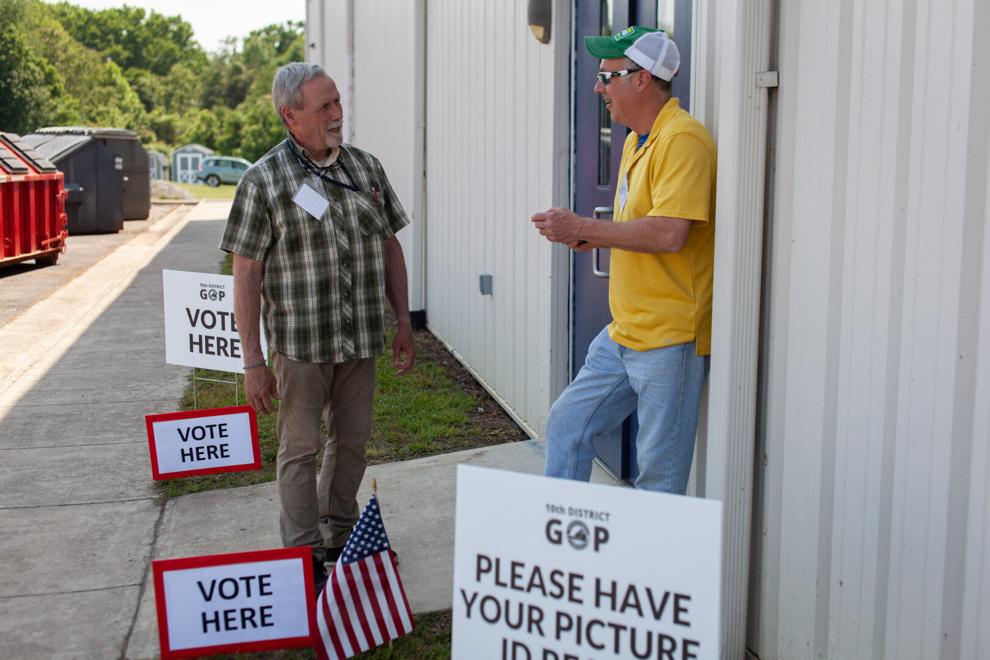
BIPARTISAN CONSENSUS: GOP chair Terry Dixon (pictured at far right with Jim Derdeyn) both feel Rappahannock’s election system and officials are trustworthy, and Mary-Sherman Willis (below), chair of the county’s Democrat Party committee. (Photo/Luke Christopher)
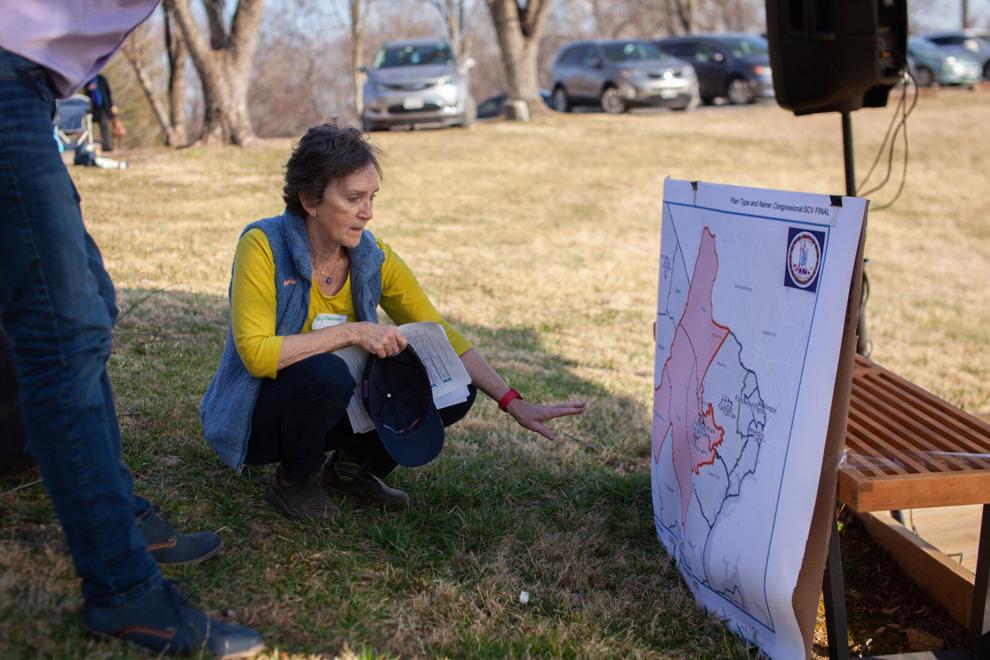
Mary Sherman-Willis (Photo/Luke Christopher)
Mary-Sherman Willis, chair of the county’s Democrat Party committee, also had high praise for Rappahannock’s election system. “I think we have excellent election officials and I have strong confidence in Kim McKiernan’s ability to run a free and fair election.” she said. “But that being said, we are prepared in the event somebody turns out to be a bad actor.”
Like Dixon, Willis does not expect to have approved observers inside the polling places. “We have experienced election officials already working inside the polls, so our focus will be what happens outside the polling stations,” she said. “We want to make sure no one is intimidated, that voters have any questions answered, and they see a good copy of a sample ballot.”
“I want to reassure voters that their vote is safe and will be properly counted,” said McKiernan. “Despite hours of training and certification, election officials, being human, can make honest procedural mistakes. But for fraud to affect the outcome of an election, it would require collusion on such a grand scale affecting virtually every level of the election process. That just doesn’t happen.”
Election mythbusters
As part of its voter education program, the Virginia Department of Elections – widely known as ELECT – has compiled some key facts to dispel myths about the election process. Here are a few highlights:
Myth – 2020 election results were fraudulent and wrong.
Fact – ELECT conducted a “risk-limiting audit” of ballot scanner machines and set a risk measurement of under .1. The presidential race audit came in at .0000065117 risk, far below the level that might have affected the election result.
Myth – People are voting twice or multiple times.
Fact – ELECT has a robust system to ensure that a voter can cast only one ballot. If a voter has been mailed an absentee ballot and then votes in person, they have to return the ballot or sign a sworn statement saying the ballot was lost or not received. If they vote in person and then try to vote absentee, the system notes the person has already voted and the absentee ballot will not be counted. The general registrar can notify law enforcement of the violation.
Myth – Underage people are voting.
Fact — If a person is 17, they can register and are eligible to vote in the general election but only if they turn 18 on or before Election Day, which is Nov. 8 this year.
Myth – Dead people are voting.
Fact – ELECT conducts an ongoing voter list maintenance program which routinely removes deceased persons and other ineligible voters from the voter rolls.
Myth – People are voting after the polls close.
Fact – Polling hours are from 6 a.m. to 7 p.m. If voters are in line by 7 p.m., they will be allowed to cast ballots.
Myth – Convicted felons are allowed to vote.
Fact – If a person has completed their sentence and probation and they have had their rights restored, they are eligible to vote. That right can only be restored by the governor of Virginia.
Myth – Voting machines are connected to the internet and can be hacked.
Fact — Voting machines in Virginia are prohibited from being connected to the internet.
For more information check out Myth Busters at ELECT’S website: https://www.elections.virginia.gov/voter-ed/mythbusters/



